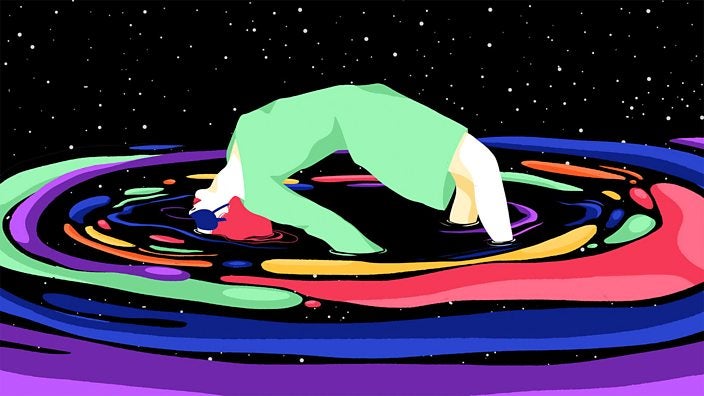

Medically reviewed by Giordano Novak, University of São Paulo on April 3rd 2022
N, N-Dimethyltryptamine, commonly known as DMT, stands as a powerful psychedelic substance that occurs naturally across a variety of plant and animal species. Celebrated for its ability to swiftly usher users into deeply immersive psychedelic states, DMT is marked by intense visual and auditory hallucinations, significant emotional revelations, and a distorted sense of time and reality. It serves as the principal component in ayahuasca, a revered brew used in certain South American rituals aimed at spiritual enlightenment and healing. Despite its prevalence in nature, DMT’s legal status is tightly regulated in numerous countries, classified as a Schedule I substance due to concerns about its abuse potential and unrecognized medical applications. Users often report transformative experiences, citing profound introspective insights and a heightened feeling of unity with the cosmos.
DMT works by interacting with the serotonin receptors in the brain, particularly the 5-HT2A receptor, which plays a crucial role in regulating mood, perception, and cognition. When DMT binds to these receptors, it induces profound changes in consciousness, leading to the psychedelic experiences associated with the substance. These experiences can include intense visual and auditory hallucinations, altered states of awareness, and profound emotional and mystical insights.
The exact mechanism by which DMT produces these effects is still the subject of ongoing research, but it’s believed that the activation of the 5-HT2A receptor leads to an increase in neural connectivity and activity across various regions of the brain. This enhanced connectivity might explain the complex and often life-changing experiences reported by users, as different areas of the brain communicate in unusual ways under the influence of DMT.
Additionally, DMT’s effects are rapid and intense but relatively short-lived compared to other psychedelics, primarily because it is quickly metabolized by enzymes in the body known as monoamine oxidases (MAOs). This rapid onset and brief duration are part of what makes DMT unique among psychedelic substances.
DMT, a potent psychedelic compound, induces a range of profound and often transformative effects on the mind and perception. Here are the key effects reported by users:
The short-term effects of DMT are profound and rapid, often occurring within moments of consumption and lasting for about 30 to 45 minutes when smoked or vaporized. These effects include:
These short-term effects, while intense, dissipate relatively quickly, leaving users back in their normal state of consciousness without lasting physical impairment.
The long-term effects of DMT on individuals are not fully understood and are the subject of ongoing research. Here are some of the reported long-term effects of DMT use:

DMT exerts its effects on the brain primarily by binding to serotonin receptors, especially the 5-HT2A receptor, which plays a crucial role in regulating mood, cognition, and perception. Here’s how DMT impacts the brain:
The full extent of DMT’s effects on the brain and its potential therapeutic benefits are still under investigation, with ongoing research exploring how this powerful psychedelic substance can alter consciousness and potentially aid in treating various mental health conditions.
DMT, while known for its profound psychedelic experiences, can also have several side effects. Users may experience increased heart rate and blood pressure, dizziness, and nausea shortly after ingestion. The intense nature of DMT trips can lead to psychological discomfort, including anxiety, paranoia, and overwhelming fear for some individuals. The vivid hallucinations and altered sense of reality can be disorienting and lead to a temporary dissociation from the self or environment. Additionally, while rare, there is a potential risk of persisting perception disorder (HPPD), where users continue to experience visual disturbances and flashbacks long after the drug has been metabolized. It’s important to approach DMT with caution, understanding both its potential for profound insight as well as the risks associated with its use.
Taking DMT safely involves careful consideration and preparation to minimize risks and ensure a positive experience. Here are essential guidelines for using DMT responsibly:
Dive into the depths of consciousness with Prisms LSD, your trusted online portal for DMT in Canada. Our commitment to quality, safety, and enlightenment ensures a seamless journey into the mystical. Prisms LSD offers an exclusive selection of DMT, curated for those seeking to explore beyond the veil of ordinary perception. With unparalleled customer service and discreet delivery, we make your quest for transcendence both safe and profound. Embark on an unforgettable journey with Prisms LSD, where every click opens a door to new realms of understanding. Discover the key to inner worlds—visit Prisms LSD today and elevate your experience.
Timmermann, C., Roseman, L., Schartner, M., Millière, R., Williams, L. W., Erritzøe, D., Muthukumaraswamy, S., Ashton, M., Bendrioua, A., Kaur, O., Turton, S., Nour, M. M., Day, C., Leech, R., Nutt, D., & Carhart‐Harris, R. (2019). Neural correlates of the DMT experience assessed with multivariate EEG. Scientific Reports, 9(1). https://doi.org/10.1038/s41598-019-51974-4
Timmermann, C., Roseman, L., Haridas, S., Rosas, F., Luan, L. X., Kettner, H., Martell, J., Erritzøe, D., Tagliazucchi, E., Pallavicini, C., Girn, M., Alamia, A., Leech, R., Nutt, D., & Carhart‐Harris, R. (2023). Human brain effects of DMT assessed via EEG-fMRI. Proceedings of the National Academy of Sciences of the United States of America, 120(13). https://doi.org/10.1073/pnas.2218949120
Subscribe and get $15 off your next order!
PRISMS LSD CANADA
ATTENTION: NEW PAYMENT EMAIL AT CHECKOUT. PLEASE PAY ATTENTION Dismiss